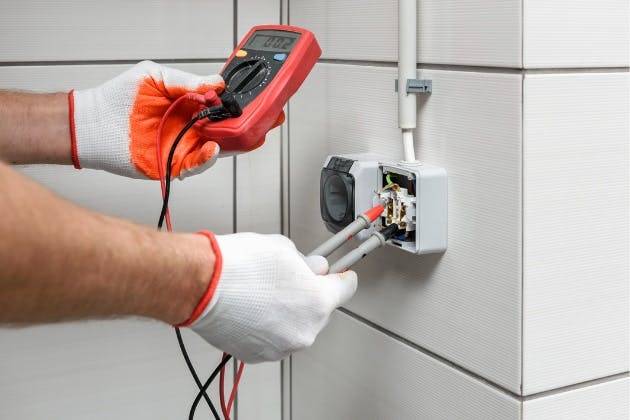Thank you for visiting our thorough guide to electrical safety. At GES Electrical, we place a high priority on the security of your house and work to give you the necessary knowledge and instructions to guarantee a safe electrical environment. This comprehensive guide offers guidance and recommendations to reduce risks and potential hazards while covering numerous aspects of electrical safety.
Understanding Electrical Safety

The Importance of Electrical Safety
Electrical safety is essential for protecting your house, loved ones, and property from harm. Electrical safety precautions that are neglected can result in mishaps, fires, and even fatalities. You can establish a safe living environment for yourself and your loved ones by using appropriate practices and comprehending the potential risks connected with electricity.
Typical Electrical Risks
- Faulty Wiring: One of the main reasons for electrical mishaps is outdated or faulty electrical wiring. Any problems, such as exposed wires, frayed cords, or loose connections, must be quickly found and fixed.
- Overloading Electrical Circuits: Connecting too many appliances or devices to a single outlet can cause an electrical circuit to be overloaded, which can cause overheating and create a fire hazard. It's crucial to comprehend your home's electrical capability and distribute the load properly.
- Water and Electricity: Electric shocks or electrocution can occur when water and electricity are combined, which is quite dangerous. Make sure to keep electrical devices and outlets far from water sources like sinks, bathtubs, and swimming pools.
- Absence of ground fault circuit interrupters (GFCIs): GFCIs are intended to promptly cut power when a ground fault develops in order to prevent electric shock. For increased safety, GFCIs must be installed in wet locations like bathrooms, kitchens, and outdoor outlets.
Practical Electrical Safety Tips
Regular Inspection and Maintenance
It is advised to undertake these maintenance procedures to keep your home's electrical system secure and effective:
- Professional Inspections: Plan periodic inspections of your electrical system by a licenced electrician to evaluate its condition, spot possible problems, and perform any necessary maintenance or improvements.
- Switches and outlets: Check your outlets and switches frequently for any damage indications, such as loose connections or discolouration. Repair damaged parts right away.
- Extension leads and cords: Look for frayed wires, exposed conductors, or cracked insulation in power cables and extension leads. To prevent electrical dangers, rapidly replace broken cords.

Safe Electrical Practices
You can considerably lower the danger of electrical mishaps by observing these recommendations:
- Proper Use of Electrical Appliances: Read and follow the manufacturer's instructions for the safe usage of electrical appliances. To minimise overheating, avoid overloading circuits and make sure there is adequate ventilation.
- Childproofing Outlets: To stop young children from sticking things into electrical outlets, install safety plugs or tamper-resistant outlet covers.
- Use of Surge Protectors: Utilize surge protectors to safeguard electronic devices from power surges and voltage fluctuations.
- Educating Family Members: Teach your family members about electrical safety procedures, especially the younger members. Teach kids not to use moist hands to operate electrical outlets or other equipment.
Emergency Planning
Even with precautions taken, emergencies can still happen. It is essential to be ready for such circumstances:
- Smoke Alarms: Install smoke alarms on every level of your home and test them regularly to ensure they are functioning correctly. As required, change the batteries.
- Fire extinguishers: Keep them close to electrical panels, in the garage, and other easily accessible areas. Learn how to use them correctly, and have them inspected frequently.
- Emergency numbers: A list of emergency phone numbers, including those for the nearby fire department and an electrician, should be posted on the refrigerator or close to your phone.
Conclusion
Every homeowner should be especially concerned about electrical safety. You may make your house safer and lower the chance of electrical mishaps by adhering to the rules and suggestions provided in this detailed guide. Not only does putting electrical safety first safeguard your loved ones, but it also gives you peace of mind. Keep in mind that the best way to avoid potential risks is to be proactive about electrical safety.
Keep in mind that putting electrical safety first requires continual work. To keep your house secure, keep up with the most recent best practices, laws, and technological developments in electrical safety. Contact us at GES Electrical with any specific questions or concerns.

